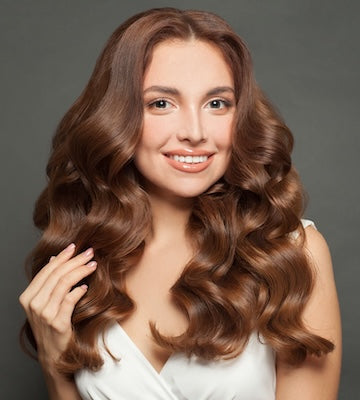Poor sleep can leave you with dark circles and low energy. But it can also affect your hair in ways you might not expect. From slower growth to increased shedding, sleep deprivation quietly takes its toll on your strands. Here’s what’s going on.
Beauty sleep isn’t just a cliché. It’s a cornerstone of healthy hair.
Sleep isn’t a magic cure-all, but it is one of the most powerful (and often overlooked) ways to support your body’s natural repair systems - including the ones that affect your hair and scalp.
In this article, we’ll unpack the science behind sleep and hair health: how lack of rest contributes to hair loss, what happens to your hormones and follicles when you’re overtired, and why better sleep could be one of your hair’s best allies.
Does too little sleep cause hair loss?
So, are hair loss and sleep deprivation really linked? The answer is yes. Sleep and hair health are closely intertwined, even if the signs take a while to show up.
Hair loss linked to poor sleep isn’t always sudden or dramatic. But over time, it can show up as increased shedding, thinning, slower growth, or a lacklustre appearance. That’s because your hair relies on rest just as much as the rest of your body does.
When you don’t get enough quality sleep, things start to shift in the background:
-
Your stress hormones rise: particularly cortisol, which is known to disrupt the hair growth cycle
-
Your body slows down non-essential functions: and unfortunately, hair growth is one of the first things to go when energy is being conserved
- The scalp’s immune response weakens: making it more prone to irritation, inflammation or conditions like dandruff, which can further affect follicle health
While lack of sleep might not be the sole cause of hair loss, it can absolutely be a contributing factor - especially if you’re already dealing with stress, menopausal changes, postpartum recovery, or medical issues like anaemia, PCOS or thyroid imbalances.
Does lack of sleep ruin your hair?
Let’s get this straight: no, your hair isn’t ruined, even if you’ve been running on empty lately. Most of us go through periods where sleep is in short supply, and that doesn’t mean your hair is beyond help.
But sleep is still an important part of the bigger picture when it comes to healthy, fabulous hair. Poor sleep and hair loss are linked, and it’s not just about how many hours you get. The quality of your sleep plays a big role too, influencing how strong, shiny and resilient your hair feels day to day.
So what’s actually going on behind the scenes while you sleep?
Hormonal disruption
Sleep helps regulate hormones like melatonin and oestrogen, both of which are key players in healthy hair growth.
-
Melatonin, best known for managing your sleep-wake cycle, also has antioxidant properties that protect hair follicles from damage
- Oestrogen helps extend the growth phase (anagen phase) of your hair cycle, meaning hair stays growing and on your head longer
Without enough sleep, these hormones can become imbalanced, shortening the growth phase and making hair more prone to shedding or thinning.
Increased cortisol (your body’s stress hormone)
Cortisol is a hormone your body releases in response to stress, and sleep deprivation is, in itself, a form of chronic stress.
High cortisol levels have been linked to telogen effluvium, a common and very real type of temporary hair loss that can leave you feeling anxious and frustrated, especially when you don’t know what’s causing it.
A disrupted hair growth cycle
Your hair doesn’t grow in a continuous stream. It follows a cycle:
-
Anagen: the active growth phase
-
Catagen: a brief transitional phase
- Telogen: the resting phase (when shedding occurs)
When you’re sleep-deprived, this cycle can get knocked out of rhythm. More hairs than normal may move into the telogen (shedding) phase too early, and fewer follicles remain in the growth phase.
Scalp health and immune response
Sleep also supports your immune system. When your immunity dips, it can show up in your skin and scalp.
An unhealthy scalp can become dry, itchy, inflamed, or flaky, all of which can weaken hair follicles and make strands more prone to falling out or breaking. Conditions like dandruff and eczema often flare up during periods of poor sleep and high stress.
Over time, the connection between sleep deprivation and hair loss becomes clearer, as disrupted hormone levels and poor follicle health take their toll.
Dullness, dryness and texture changes
Lastly, there’s how your hair actually looks and feels. Without enough sleep, your body may not produce enough sebum (your natural scalp oils) or repair damaged keratin structures properly. That can leave your hair looking dry, frizzy, dull and lifeless - a far cry from the smooth, glossy strands we’re all hoping for.
Can more sleep improve hair health?
Yes. Rest really can help restore your hair’s natural vitality.
Think of sleep as your body’s reset button. When you’re well-rested, everything works more smoothly: hormone levels stay balanced, stress levels fall, and cells get the time they need to repair and regenerate. That includes the cells in your scalp and hair follicles.
A good night’s sleep can:
- Support stronger hair fibres by helping your body rebuild keratin (the protein your hair is made of)
- Regulate sebum production, which helps keep your scalp moisturised and balanced
- Reduce inflammation, which is especially helpful if you’re prone to scalp sensitivity or flare-ups
- Maintain circulation to the scalp, helping oxygen and nutrients reach the follicles more easily
Over time, this all contributes to shinier, fuller-looking hair, especially when combined with a nutritious diet, gentle hair care, and protection from harsh styling or environmental damage.
Can better sleep regrow hair?
Sleep absolutely supports regrowth - but it’s not a standalone solution.
If you’re experiencing noticeable thinning or bare patches, we know, it’s emotionally tough. And often, the causes are layered. Hormones, stress, nutrition, genetics… it’s rarely just one thing.
Better sleep won’t undo it all overnight. But it can offer your body something precious: the chance to catch its breath, to balance out, and to support healthier regrowth over time.
In cases like postpartum hair loss, menopausal thinning or stress-related shedding, improving your sleep quality can absolutely be part of the solution. Your body needs time, rest, and support to recover - and sleep helps make that possible.
So if you’re actively trying to regrow hair, think of sleep as one of the foundations. It’s not a miracle treatment. But it is one of the kindest, most sustainable things you can do for yourself (and your hair).

Does sleeping make your hair thicker?
Not exactly. But better quality sleep can make your hair appear thicker and feel healthier over time.
Hair thickness is mostly determined by genetics: how many hair follicles you have, and how thick each individual strand is. Getting more sleep won’t change your hair’s genetic blueprint - but it can improve the health of each strand, making your hair appear fuller, shinier and stronger.
When you sleep well:
- Your hair retains moisture better, which can improve volume and reduce breakage
- Your scalp stays healthier, reducing inflammation that might otherwise shrink follicles
- Hair remains longer in the growth phase, which can result in less shedding and more visible density
So while sleep won’t turn fine hair into ultra-thick hair, it will support a stronger, healthier head of hair - especially if you’re using the right products and protecting it overnight.
If you’d like help in the meantime, Phoenix Crown’s luxury hair extensions blend effortlessly with your natural hair, adding instant volume and bounce.
How many hours of sleep is needed for hair growth?
Although there’s no one-size-fits-all number (and so many factors that go into hair growth!), as a general rule, aim for 7–9 hours of quality sleep per night.
It’s not just about total hours. It’s about sleep quality too. Deep, uninterrupted sleep (especially during stages 3 and 4 of the sleep cycle) is when most of the body’s repair and growth processes take place.
If you’re waking frequently, sleeping at irregular times, or not reaching deeper stages of rest, your body may struggle to carry out those important behind-the-scenes functions, including ones that support hair growth.
To support a regular, healthy sleep pattern, try:
- Keeping a consistent sleep schedule (even on weekends)
- Reducing blue light before bed (phones, tablets, screens)
- Avoiding caffeine after mid-afternoon
- Creating a calm bedtime routine (including self-care when possible) to signal wind-down time
And if you think something might be getting in the way of your sleep (like loud snoring, waking up gasping, or feeling exhausted even after a full night’s rest), it’s worth getting it checked out.
Conditions like sleep apnea often go undiagnosed, but they can have a big impact on your health, including your hair. There’s growing evidence that sleep apnea and hair loss are linked, likely because poor oxygen flow and disrupted sleep put extra stress on the body.
The good news? Getting the right support can make a real difference - not just to how you feel, but to how your hair looks.
What is the best time to sleep for hair growth?
Your body runs on a natural rhythm called the circadian cycle, which affects everything from hormone release to cell repair. Getting in sync with this rhythm can really help your hair, as well as your overall well-being.
For most people, heading to bed between 10pm and midnight gives the body the best chance to reach those deep, restorative stages of sleep early in the night, when tissue repair and regeneration are working hardest.
On the flip-side, regular late nights or irregular sleep schedules throw off melatonin production and disrupt the hormones supporting hair growth. Over time, that can lead to weaker, slower-growing hair.
Of course, not everyone can stick to a “perfect” bedtime. But if you’re trying to give your hair the best support possible, aiming for earlier, more consistent sleep is a great place to start - not just for your energy, but for your hair and sleep routine too.
Is napping good for hair growth?
We’ve talked a lot about deep, restorative sleep. But what about those midday dozes?
While naps won’t make up for a full night’s rest, they can still offer a helpful boost, especially if you’re running on empty.
A short nap (around 20–30 minutes) can reduce cortisol levels, the stress hormone that interrupts the hair growth cycle. So if you’re feeling overwhelmed, a quick rest might do more than clear your head. It protects your hair, too.
Just be mindful that naps don’t interfere with your main sleep routine. If you’re struggling to drift off at night, try to keep naps short and earlier in the day.
Final thoughts: Don’t sleep on sleep
Hair health isn’t just about what you put on your head. It’s also about what’s happening inside your body.
When you’re consistently well-rested, your whole system benefits. Hormones rebalance and stress levels ease, breaking the cycle between lack of sleep and hair loss, giving your follicles the chance to repair, grow and thrive.
At Phoenix Crown, we know hair journeys are personal. Whether you're dealing with hormonal changes, postpartum shifts, or just feeling like your hair’s fullness is declining, we’re here to support you. Gently and beautifully.
Our 100% natural, lightweight Virgin hair extensions are designed to blend effortlessly and seamlessly, giving stunning volume without extra strain. So you can wake up feeling like yourself again - only with a little extra confidence.










